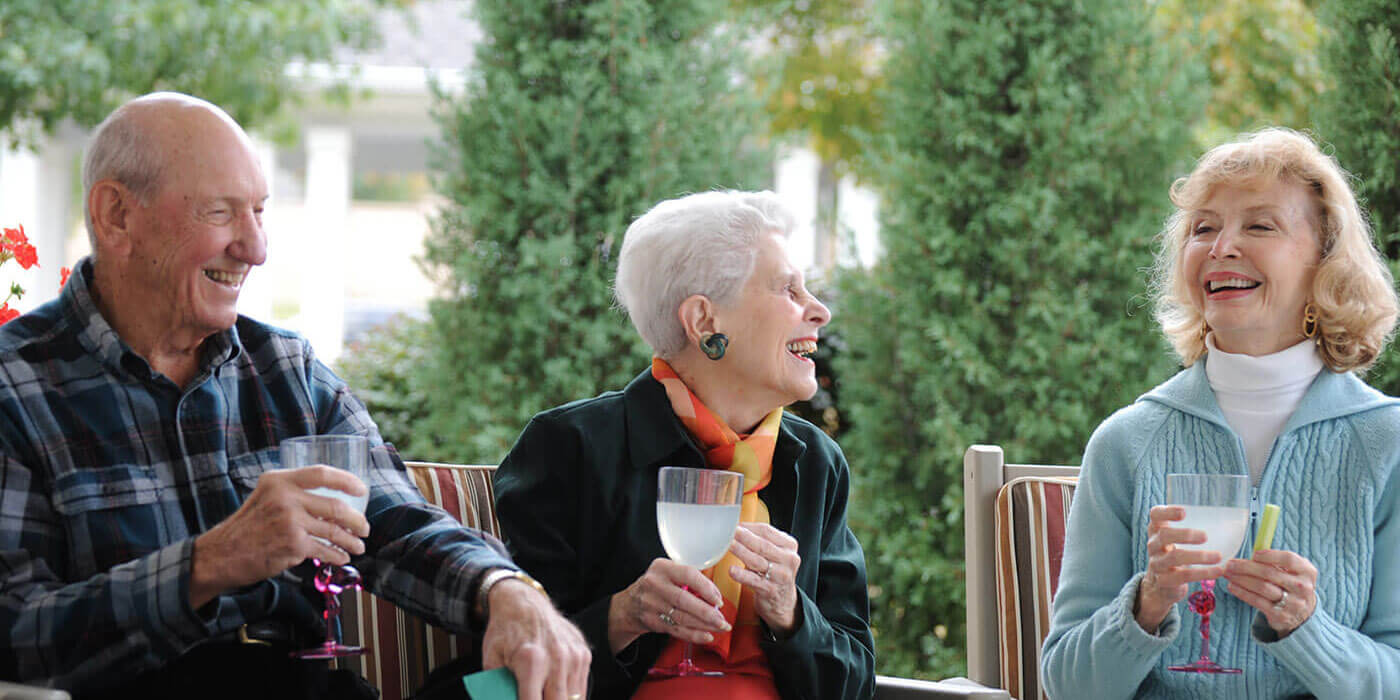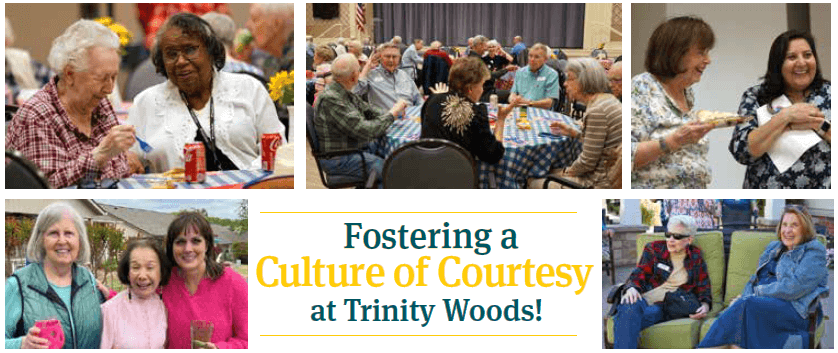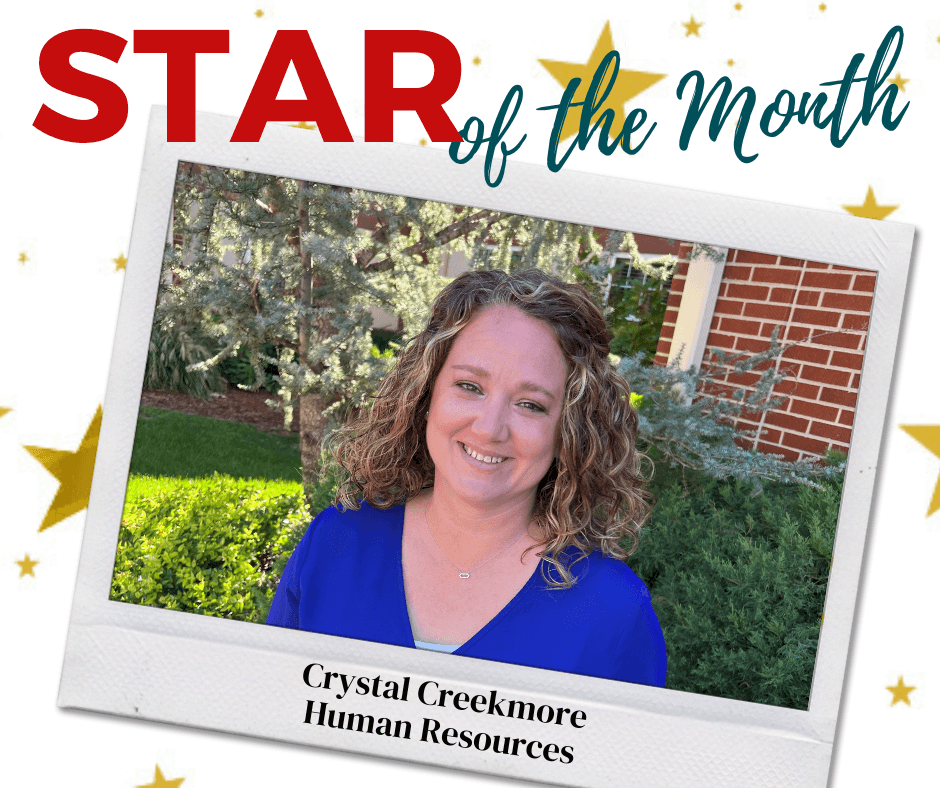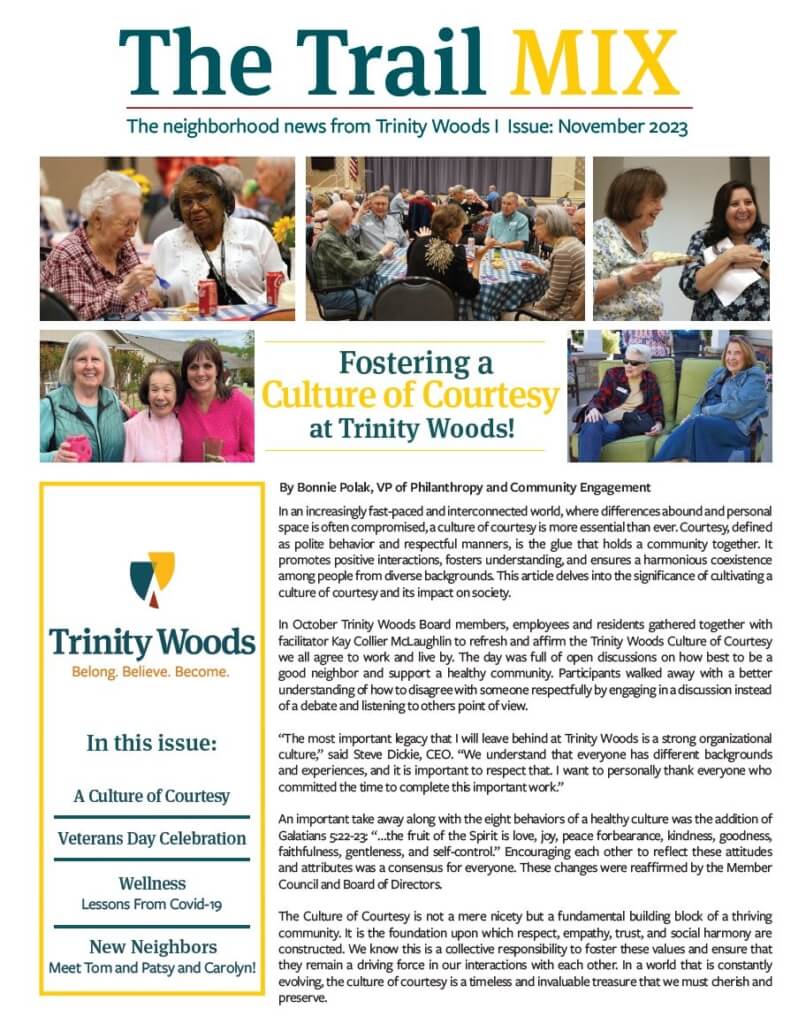By Bonnie Polak, VP of Philanthropy and Community Engagement
In an increasingly fast-paced and interconnected world, where differences abound and personal space is often compromised, a culture of courtesy is more essential than ever. Courtesy, defined as polite behavior and respectful manners, is the glue that holds a community together. It promotes positive interactions, fosters understanding, and ensures a harmonious coexistence among people from diverse backgrounds. This article delves into the significance of cultivating a culture of courtesy and its impact on society.
In October Trinity Woods Board members, employees and residents gathered together with facilitator Kay Collier McLaughlin to refresh and affirm the Trinity Woods Culture of Courtesy we all agree to work and live by. The day was full of open discussions on how best to be a good neighbor and support a healthy community. Participants walked away with a better understanding of how to disagree with someone respectfully by engaging in a discussion instead of a debate and listening to others point of view.
“The most important legacy that I will leave behind at Trinity Woods is a strong organizational culture,” said Steve Dickie, CEO. “We understand that everyone has different backgrounds and experiences, and it is important to respect that. I want to personally thank everyone who committed the time to complete this important work.”
An important take away along with the eight behaviors of a healthy culture was the addition of Galatians 5:22-23: “…the fruit of the Spirit is love, joy, peace forbearance, kindness, goodness, faithfulness, gentleness, and self-control.” Encouraging each other to reflect these attitudes and attributes was a consensus for everyone. These changes were reaffirmed by the Member Council and Board of Directors.
The Culture of Courtesy is not a mere nicety but a fundamental building block of a thriving community. It is the foundation upon which respect, empathy, trust, and social harmony are constructed. We know this is a collective responsibility to foster these values and ensure that they remain a driving force in our interactions with each other. In a world that is constantly evolving, the culture of courtesy is a timeless and invaluable treasure that we must cherish and preserve.
Month: November 2023
Fostering a Culture of Courtesy at Trinity Woods!
Who’ll Say Grace?
By Weldon Tisdale, Chaplain
A hot, glistening bird commands the laden table, as grandma calls everyone to dinner. Eight-year-old Jennifer proudly lugs her July-born sister to the table. Grandpa and dad get up slowly with a long backward glance to see the tight end catch a pass and be forced out of bounds at the twenty-yard line. The game continues in the background without them.
“Who’ll say grace?” grandma asks. Grown-ups look awkwardly at each other in strained silence. Finally, Uncle John snickers and parrots the word “grace,” and laughter spills over the tension. Grandma steps in. “Jennifer, why don’t you say the prayer you learned in Sunday School when you were in kindergarten.” She recites. The feast begins.
Embarrassed silence replaces thanksgiving, gluttony displaces gratefulness. Thanksgiving–an expression of gratitude to God for benefits received – is too often absent from our hollow holiday.
There is, however, an ancient custom which can reclaim the day.
We read, Jesus “took the seven loaves and the fish, and when He had given thanks, He broke them and gave them to the disciples.” (Matthew 15:36) At the Last Supper Jesus took bread and gave thanks, lifted the cup, gave thanks and offered it to His followers. (Mark 14: 22-25) Jesus always prayed before meals.
We can, too. A simple prayer of thanks at each family meal of the year will gradually restore thankfulness to us. As our children and families see us humble ourselves to thank our Creator, they too learn to be grateful. Robert Lintner said it well: “Thanksgiving was never meant to be shut up in a single day.”
This habit of family thankfulness can begin around our tables now–the first of many prayers of thanks to
be offered. Now, “Who’ll Say Grace?”
Adapted from www.joyfulheart.com
Lessons from the Covid Pandemic
By Lupina Fry, Wellness Nurse
There were multiple things we learned going through the early stages of the Covid pandemic. You can have too much toilet paper if others need it too. You can’t trust everything you hear, turn to reliable and trusted sources for guidance. Staying active and socially connected is important for mental health and
wellbeing. Vaccines are important, but not the only defense. Practices such as masking, frequent and thorough hand washing and staying home when sick all worked to limit illness throughout the pandemic. And it not only limited the spread of Covid, but it also limited cold and flu transmissions as well.
Though we know Covid is spread by tiny aerosol particles as we talk, cough, or sneeze, science is still unsure how often it spreads through this airborne route. It’s also spread through surface transmission, from person to person by touching contaminated surfaces and then touching eyes, nose, and mouth. Studies also suggest virus particles found in feces may also spread the virus. People could infect things or other people if they don’t wash their hands properly after using the bathroom. Perhaps one of the most puzzling things we’ve learned is that Covid affects people differently. Even when fully vaccinated, one person may have a few days of mild cold-like symptoms, but it can be a life-threatening situation for another.
Staying vigilant of the possibility of contracting any virus- cold, flu, RSV or Covid- from surfaces we touch makes sense. A good handwashing means 20 seconds of scrubbing all surfaces of both hands, top and palms, with warm soapy water, rinsing well, grabbing a paper towel, and drying your hands thoroughly then using that towel to turn off the water and if in the bathroom, to open the bathroom door. Carrying hand sanitizer when you’re out and about and especially keeping your hands and fingers out of mouth, nose, and eyes are important. If you’re traveling, in crowded areas or with strangers, wear a mask, and if you are feeling unwell, stay home. If you’re unsure if you have Covid perform a self-test and contact your primary care physician for support.
Covid isn’t going anywhere. Heeding lessons learned is our best line of defense for the continued health and safety of ourselves and our family, friends, and neighbors.
November STARS Employee of the Month
Crystal Creekmore
HR Generalist, Human Resources
Start Date: February 2019
Born: Tulsa, Oklahoma
Raised: Mounds, Oklahoma
Education: Northeastern State University
Wanted to be as a Kid: Scientist
Favorite Sport: Football, Softball and Basketball
One Meal Forever: Chips and Queso
Hobbies: Watching Sports
First Job: Grocery Store Clerk
Favorite Holiday: Christmas
Favorite Bible Verse: “Do not be anxious about anything, but in everything by prayer and supplication with
thanksgiving let your requests be made known to God.” Philippians 4:6
Family Recipe: New Year’s Day Black Eyed Peas
Favorite TV Show: Friends
Collects: Puzzles
Fun Fact: State Champion in Track (4×100 Relay)
Family: Married with two Daughters
What her supervisor says: “I appreciate Crystal’s attention to detail, her professionalism, and her ability to handle even the most challenging situations with grace and empathy. She provides excellent customer service and guidance to all that seek her assistance. Her tireless efforts in ensuring that Human Resources is a valued asset to Trinity Woods is commendable and we are blessed to have her here providing an extraordinary level of service.” Bill Peterson, VP of Human
Resources
November Issue of The Trail Mix
In This Issue:
Fostering a Culture of Courtesy
In an increasingly fast-paced and interconnected world, where differences abound and personal space is often compromised, a culture of courtesy is more essential than ever. Courtesy, defined as polite behavior and respectful manners, is the glue that holds a community together. It promotes positive interactions, fosters understanding, and ensures a harmonious coexistence among people from diverse backgrounds. This article delves into the significance of cultivating a culture of courtesy and its impact on society.
Trinity Woods Board members, employees and residents gathered together with facilitator Kay Collier McLaughlin to refresh and affirm the Trinity Woods Culture of Courtesy we all agree to work and live by. The day was full of open discussions on how best to be a good neighbor and support a healthy community. Participants walked away with a better understanding of how to disagree with someone respectfully by engaging in a discussion instead of a debate and listening to others point of view.
The Culture of Courtesy is not a mere nicety but a fundamental building block of a thriving community. It is the foundation upon which respect, empathy, trust, and social harmony are constructed. We know this is a collective responsibility to foster these values and ensure that they remain a driving force in our interactions with each other. In a world that is constantly evolving, the culture of courtesy is a timeless and invaluable treasure that we must cherish and preserve.
November STAR Employee of the Month announced – Crystal!
November Wellness Events
Wellness Nurse, Lupina Fry, discuss all the lessons learned from Covid that should still be in practice as we enter cold and flu season.
We also celebrate Veterans Day with Nathan Hale High School ROTC will present the colors. Joshua Taylor, a senior at Jenks High School, will sing the National Anthem.
The month won’t be complete without a Thanksgiving Reception, Saturday at the Symphony and a good old fashion Oklahoma sing-a-long!
New Neighbors
Meet Tom and Patsy and Carolyn!





